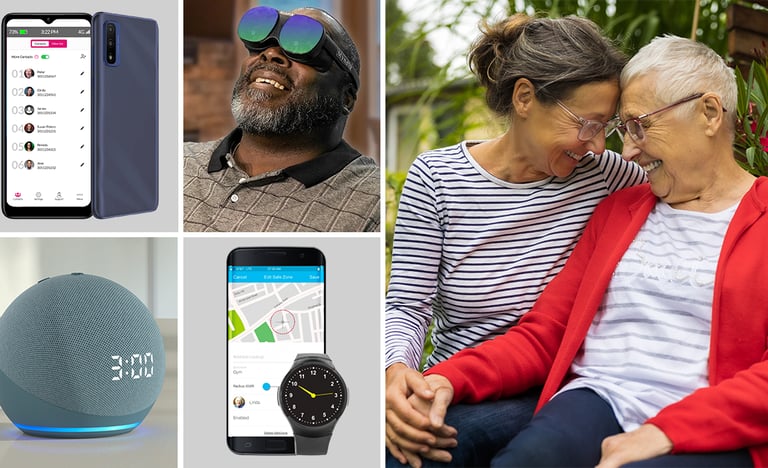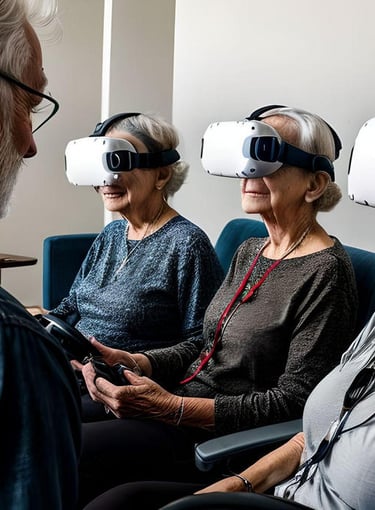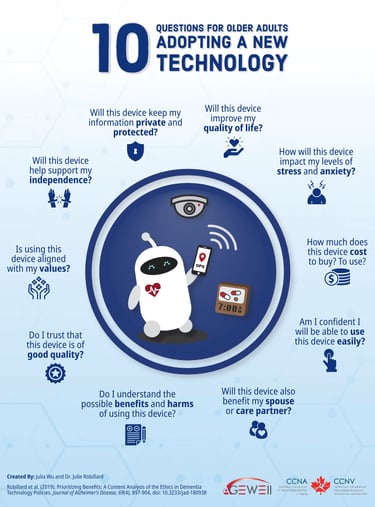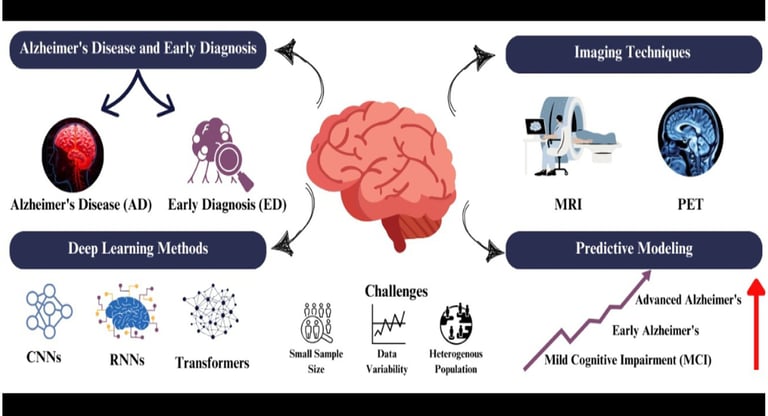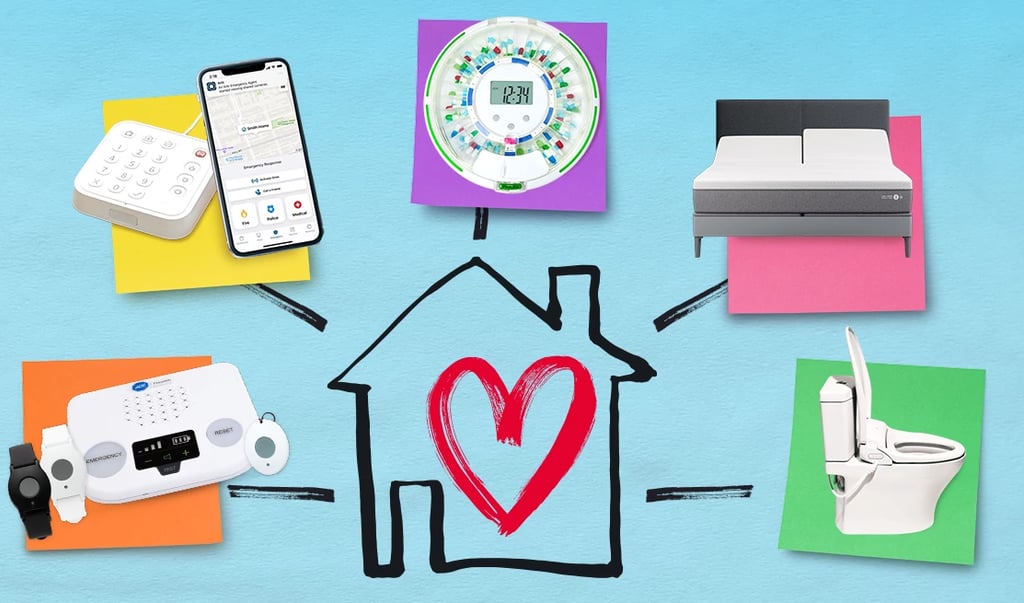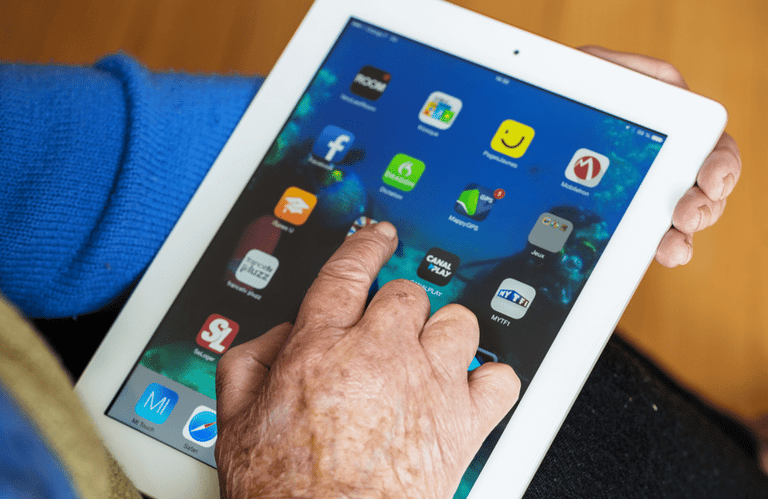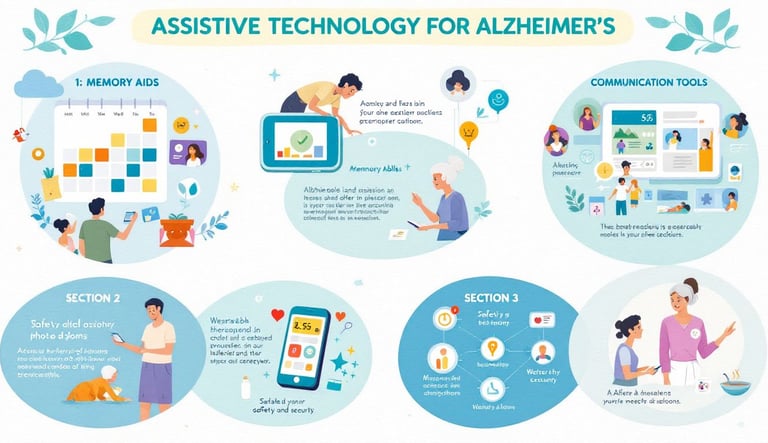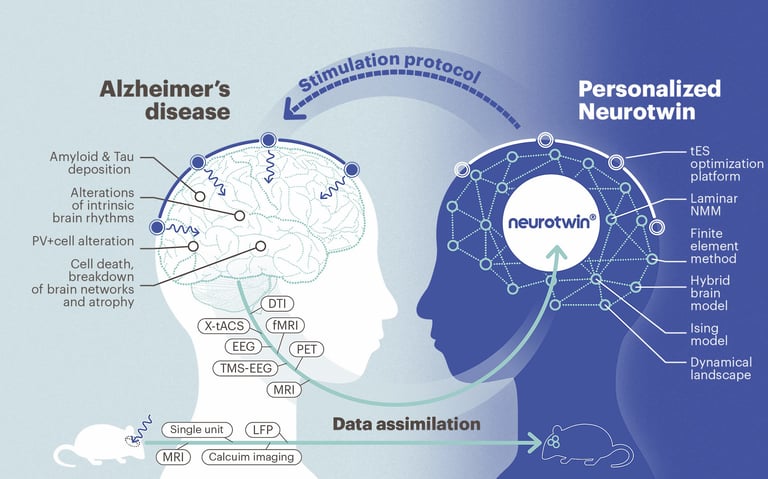Digital Technology: A Modern Ally in Alzheimer's Treatment and Cognitive Recovery
Alzheimer’s digital treatment, brain health technology, VR therapy Alzheimer’s, AI early detection dementia, cognitive recovery apps. part 2
Gajanan L. Bhonde
9/21/202511 min read


Introduction to Digital Technology in Alzheimer's Care
In recent years, the integration of digital technology into healthcare has transformed various fields, including Alzheimer’s care. Alzheimer's disease, a progressive neurological disorder, affects millions globally, leading to cognitive decline and an array of challenges for patients and caregivers alike. Digital technology offers a multifaceted approach to address these challenges, improving the management and treatment of this complex condition.
One of the significant benefits of leveraging technology in Alzheimer's care is early detection. Innovative tools such as mobile applications and artificial intelligence algorithms can analyze behavioral patterns and cognitive functions to identify potential symptoms of the disease. Early intervention is crucial, as it not only allows for timely treatment but also empowers families and healthcare providers to plan and implement appropriate caregiving strategies. Digital platforms can thus serve as a first response, enhancing the ability to detect Alzheimer’s at an earlier stage.
Additionally, treatment methods have evolved with the aid of digital technology. Therapeutic apps, virtual reality environments, and cognitive training exercises can help stimulate cognitive functions, offering patients a chance to maintain mental engagement and improve their quality of life. These tools not only aid in individual cognitive recovery but also provide caregivers with valuable resources that facilitate their roles in patient support. By introducing a variety of interactive methods, technology promotes a more engaging and less isolating experience for those affected by Alzheimer’s.
Moreover, digital technology impacts the overall quality of life for individuals with Alzheimer’s disease. From communication tools that foster social interaction to telehealth services that provide remote access to healthcare, these advancements greatly enhance the caregiving process. Through improved connectivity and support, both patients and caregivers can experience relief from the burdens associated with the disease. In this dynamic landscape, digital technology emerges as a modern ally in Alzheimer’s treatment and cognitive recovery.
Early Detection with Artificial Intelligence (AI)
Artificial Intelligence (AI) is reshaping the landscape of Alzheimer's disease detection by enhancing the capacity for early diagnosis. Traditional diagnostic methods often rely on thorough clinical evaluations and neuroimaging, which may not always detect the disease until significant cognitive decline has occurred. However, AI-driven methodologies can analyze vast amounts of data to identify patterns and biomarkers associated with Alzheimer's at much earlier stages, thereby facilitating timely intervention.
One of the primary avenues through which AI improves early detection is through the analysis of large datasets, including medical records, genetic information, and neuropsychological tests. Machine learning algorithms can process this information to uncover subtle changes in cognitive function that may indicate the onset of Alzheimer’s, often long before clinical symptoms become apparent. For instance, models trained on historical patient data can predict the likelihood of developing Alzheimer's in individuals who show early signs of cognitive impairment.
In addition to data analysis, AI technology is also being utilized in imaging studies. Algorithms can evaluate MRI scans or PET scans to detect microstructural changes in the brain that are characteristic of Alzheimer's disease. These AI systems can outperform traditional analytical methods, providing faster and more accurate assessments that assist clinicians in making informed decisions about patient care.
The importance of early detection in Alzheimer’s disease cannot be overstated. Early diagnosis leads to earlier treatment options, which have been shown to slow disease progression and improve patients' quality of life. Furthermore, with AI's ability to provide personalized insights based on individual data, healthcare providers can tailor interventions that align with each patient’s specific needs. Therefore, the integration of artificial intelligence into Alzheimer’s diagnostics represents a promising advancement that may ultimately lead to better outcomes for patients and their families.
Cognitive Rehabilitation through Virtual Reality (VR) and Simulated Environments
The advent of virtual reality (VR) technology marks a significant advancement in the field of cognitive rehabilitation, particularly for Alzheimer's patients. By creating immersive digital environments, VR facilitates an engaging and interactive approach to therapy that can potentially enhance cognitive function and memory retention. The ability to simulate real-world scenarios allows patients to practice cognitive skills in a safe and controlled setting, making the rehabilitation process more effective and enjoyable.
One notable application of VR in cognitive rehabilitation involves memory training exercises designed specifically for Alzheimer's patients. For instance, applications can transport individuals to a virtual grocery store where they practice identifying and selecting items they typically purchase. This kind of simulated environment not only aids in memory recall but also stimulates decision-making skills, providing a dual benefit. Additionally, these virtual experiences can be tailored to individual preferences and familiarity, which further promotes patient engagement and participation.
Another innovative application is the use of VR for social skills training. In this scenario, patients are placed in immersive social situations where they can practice interactions with avatars representing family members, friends, or caregivers. Such environments help reduce anxiety associated with social interactions and enable patients to refine their communication skills in a supportive setting. Studies have suggested that repeated exposure to these simulated social situations can lead to improved confidence and enhanced cognitive abilities.
As the technology continues to evolve, the potential of VR in cognitive rehabilitation for Alzheimer's patients will likely expand. The inclusion of gamified elements can further incentivize engagement, making therapy sessions both enjoyable and beneficial. By leveraging the capabilities of virtual reality, healthcare providers can redefine the rehabilitation landscape for individuals affected by cognitive decline, ultimately contributing to improved outcomes in their treatment journey.
Speech Analysis and Brain Imaging Technologies
Speech analysis tools and brain imaging technologies have emerged as vital instruments in the understanding and management of Alzheimer’s disease. These technologies provide unique opportunities to monitor changes in language abilities and brain function, delivering critical insights that can inform treatment strategies. With Alzheimer’s disease significantly affecting communication skills, integrating speech analysis into clinical practice allows for the early detection of alterations in a patient's language use. This can include modifications in speech patterns, vocabulary decline, or the onset of difficulties in expressing thoughts coherently.
Moreover, brain imaging technologies, such as magnetic resonance imaging (MRI) and positron emission tomography (PET), serve to visualize structural changes and metabolic activities within the brain that accompany the progression of Alzheimer’s. These imaging modalities not only help in diagnosing the disease but also enable the tracking of its advancement over time. For instance, MRI can reveal atrophy in specific regions of the brain, while PET scans can identify abnormal protein buildups, including amyloid plaques, which are characteristic of Alzheimer’s pathology.
The combination of speech analysis and brain imaging presents a comprehensive approach to understanding cognitive impairments in Alzheimer's patients. By correlating patterns observed in speech with imaging findings, healthcare professionals can devise personalized treatment plans. These plans can encompass therapeutic interventions aimed at enhancing communication abilities while addressing the underlying cognitive decline evidenced in brain images. The integration of these technologies into routine care practices is not only promising but is essential for developing a nuanced understanding of the disease and optimizing patient outcomes throughout their cognitive journey.
Wearable Devices and Mobile Applications for Monitoring and Support
In recent years, the integration of wearable devices and mobile applications into Alzheimer’s treatment strategies has gained significant traction. These technologies offer caregivers and healthcare professionals an innovative means to monitor patients' health in real-time. Wearables, such as smartwatches and health trackers, are designed to collect vital data, including heart rate, physical activity levels, and sleep patterns. By continuously monitoring these parameters, caregivers can gain insights into the overall well-being of individuals with Alzheimer's, enabling timely interventions when necessary.
Furthermore, mobile applications have emerged as essential tools to enhance communication and coordination among caregivers, family members, and professionals. Many applications focus on creating structured daily routines for patients, which can be particularly beneficial in reducing anxiety and confusion. These routines not only foster a sense of normalcy but also empower patients to maintain some level of independence in their daily lives. Features such as reminders for medication, scheduled activities, and customized alerts can assist individuals in effectively managing their time and responsibilities.
Equipped with GPS tracking capabilities, wearable devices can also enhance the safety of patients, particularly those prone to wandering—a common issue in Alzheimer's disease. Caregivers can set geofences, receiving alerts if a patient strays beyond a designated area. This capability not only provides peace of mind but also ensures a rapid response in case of emergencies. The data generated by these wearable devices can facilitate a more personalized approach to care, allowing healthcare providers to tailor their interventions based on the unique patterns observed in each patient.
As the landscape of Alzheimer's care continues to evolve, the role of technology in monitoring and supporting patients and caregivers alike remains paramount, offering hope for improved quality of life and enhanced cognitive recovery.
Empathy Training and Smart Home Technologies
The role of technology in Alzheimer's care extends beyond mere assistance with daily tasks; it also plays a crucial part in fostering empathy and understanding among caregivers and family members. Empathy training programs leverage modern digital tools to immerse participants in the experiences of those living with Alzheimer’s disease. Virtual reality (VR) simulations, for instance, allow caregivers to experience scenarios from the patient’s perspective, enhancing their insight into the challenges these individuals face. Such innovative approaches can form a vital component of comprehensive training programs, promoting a culturally and emotionally sensitive environment for both the patient and their supporters.
These empathy training initiatives are often complemented by various online resources, including webinars, instructional videos, and interactive forums that encourage discussions about caregiving challenges. This combination of technology and education serves to not only raise awareness but also equip caregivers with strategies to respond more compassionately to the needs of their loved ones. As caregivers gain a deeper understanding of the emotional landscape navigating Alzheimer’s, they become more effective in providing the necessary support and companionship, thereby enhancing the overall caregiving experience.
In addition to empathy training, smart home technologies significantly improve the quality of life for Alzheimer's patients. These technologies encompass a range of devices designed to enhance safety and accessibility within the home. Automated systems, for example, can alert caregivers to unusual behaviors or provide reminders for medication intake, ensuring that patients adhere to their treatment plans. Furthermore, smart home features, such as voice-activated assistants, allow patients to maintain a level of independence by controlling their environment, from adjusting lighting to accessing information easily.
Ultimately, the integration of technology into everyday caregiving not only promotes safety and security but also fosters a dignified living space for Alzheimer's patients, allowing them to remain in their own homes. The combination of empathy training and smart technologies thus emerges as a comprehensive support system that facilitates a better understanding of the patient experience while enhancing their living conditions.
The Future of Digital Alzheimer’s Care
The landscape of Alzheimer’s care is undergoing a transformation thanks to advancements in digital technology. As we look to the future, the integration of personalized treatment methods, advanced monitoring solutions, and enhanced accessibility is pivotal in improving the quality of care for individuals living with Alzheimer’s disease. One of the most promising trends is the use of artificial intelligence (AI) to tailor treatment plans to the specific needs of each patient. This personalization ensures that therapeutic interventions are not only effective but also suited to the cognitive profile and progression of the disease in each individual.
Moreover, innovative monitoring solutions are emerging that utilize wearable devices and mobile applications to track cognitive function and daily activities in real-time. These technologies enable caregivers and healthcare professionals to observe changes more accurately, facilitating timely interventions when necessary. For instance, smart home devices equipped with alerts can provide caregivers with critical insights into patients’ behaviors, potentially identifying symptoms or changes earlier than traditional methods could allow.
Accessibility is another crucial area in the evolution of Alzheimer’s care. Digital platforms are increasingly being designed to ensure that they are user-friendly for both patients and caregivers. This includes simplified interfaces and features that cater to individuals with cognitive impairments, empowering them to engage more fully with their treatment. Telehealth also plays a significant role, breaking down geographical barriers and allowing patients to access specialized care from the comfort of their homes.
In addition, ongoing research and innovation are vital to discovering new tools and technologies that can further enhance care delivery. Funding and collaboration among researchers, tech developers, and healthcare providers will be essential to drive these innovations forward. The potential impact of these advancements on the lives of individuals with Alzheimer’s, as well as their caregivers, cannot be overstated, heralding a brighter future for those affected by this challenging disease.
Conclusion
Throughout this blog post, we have explored the pivotal role digital technology plays in the treatment of Alzheimer’s and cognitive recovery. The integration of innovative tools such as mobile applications, virtual reality, and cognitive training programs illustrates how advancements in technology serve as a transformative ally for both patients and caregivers. Such solutions not only facilitate effective monitoring and management of symptoms but also enhance engagement in cognitive activities, potentially leading to improved outcomes.
The need for ongoing research in this domain cannot be overstated. As digital solutions continue to evolve, they hold the promise of providing personalized care options that can adapt to the unique needs of individuals with Alzheimer’s. Moreover, advancements in artificial intelligence and machine learning offer new pathways for developing targeted therapeutic interventions that can further amplify the effectiveness of cognitive recovery efforts.
It is also essential to consider the implications for caregivers who are often overwhelmed by the challenges posed by Alzheimer’s disease. Digital technology offers practical resources that can alleviate some of this burden, fostering a more supportive environment for both patients and their families. By enabling better communication and sharing of information among healthcare providers, caregivers, and patients, these tools can lead to improved collaboration and a heightened understanding of care practices.
In conclusion, the integration of digital technology into Alzheimer’s treatment protocols and cognitive recovery strategies represents a significant advancement in enhancing the quality of life for patients. As we continue to embrace innovative findings and tools, we must advocate for further research and broader application of these technologies within care practices. This collective effort ultimately underscores the importance of adapting to a rapidly evolving landscape where digital solutions offer new hope for managing Alzheimer’s and fostering meaningful cognitive recovery.
Digital technology is transforming Alzheimer's care, offering innovative solutions for early detection, cognitive rehabilitation, and daily management. By integrating these tools into care plans, individuals with Alzheimer's and their caregivers can experience improved quality of life and better outcomes. Embracing these technologies is not just about innovation; it's about providing compassionate, effective care for those affected by Alzheimer's disease.
The Future of Digital Alzheimer's Care
The integration of digital technology in Alzheimer's care is still evolving, with promising developments on the horizon.
Personalized Treatment: AI and machine learning can analyze individual data to create personalized care plans. Appventurez
Advanced Monitoring: Wearable devices with advanced sensors can provide real-time data on various health parameters, enabling proactive care. Johns Hopkins Public Health
Enhanced Accessibility: As technology becomes more accessible, a broader range of individuals will benefit from digital tools in Alzheimer's care. Alzheimer’s Association
